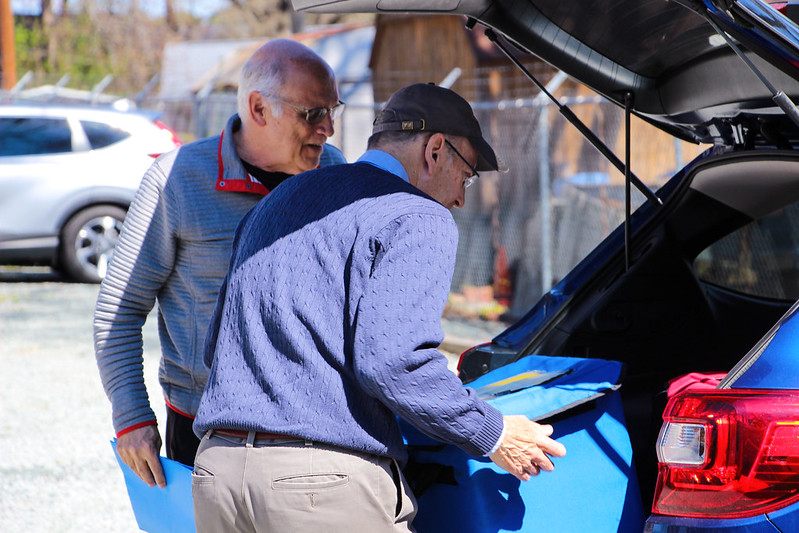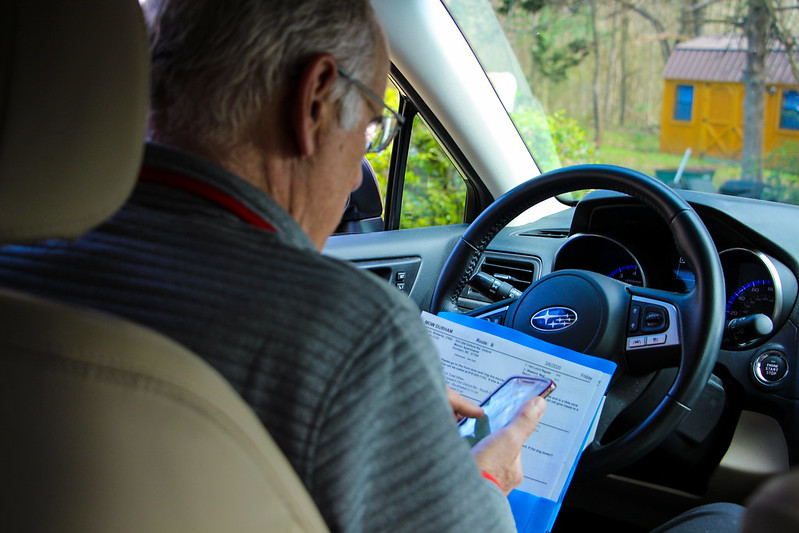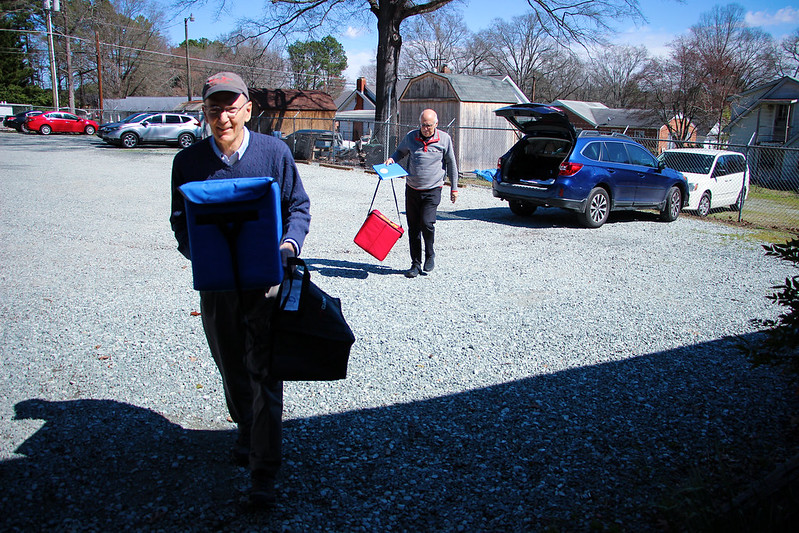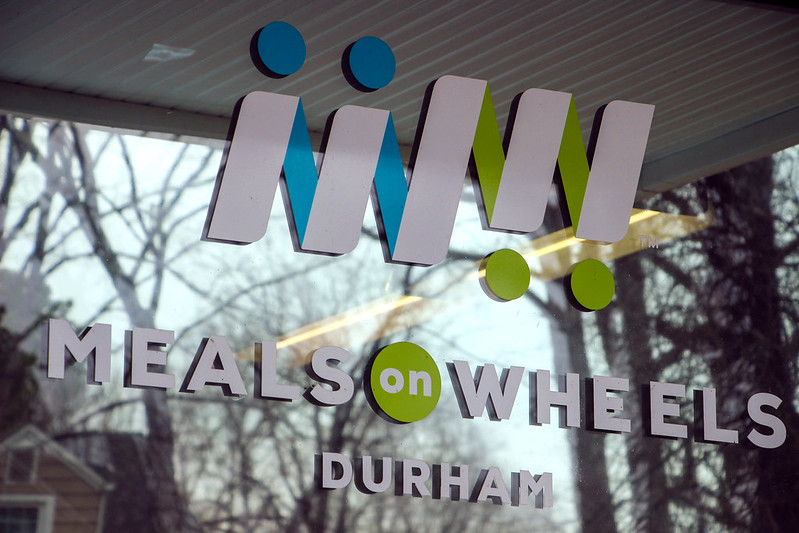Serving the community: A ride-along with faculty Meals on Wheels volunteers
For nearly 40 years, Duke Law professors have volunteered with groups like Meals on Wheels to deliver food to people in need throughout the Durham community.
 Professor Christopher Schroeder, Meals on Wheels Program Coordinator Brittany Barnes, and Professor Charles Clotfelter
Professor Christopher Schroeder, Meals on Wheels Program Coordinator Brittany Barnes, and Professor Charles Clotfelter
On a sunny Friday in early March — before stay-at-home orders went into place in Durham and North Carolina — Professors Christopher Schroeder and Charles Clotfelter are driving through East Durham, delivering meals to homebound people. It’s a digression from teaching and scholarship they have been taking regularly for more than 37 years as members of a platoon of Duke Law faculty and staff volunteers for Meals on Wheels, a nonprofit that serves more than 500 Durham County residents every weekday.
“When we started off, we had a route near Miami Boulevard, then we had a route once, for a long while, not too far from Duke, near the Maplewood Cemetery,” recalls Clotfelter, the Z. Smith Reynolds Professor of Public Policy and Professor of Economics and Law. He gets in and out of the car to drop meals off and navigates their delivery route while Schroeder, the Charles S. Murphy Professor of Law and Public Policy Studies, drives.
Over the decades, delivery routes have taken the two through parts of Durham they say they might not have otherwise seen, and given them the chance to chat with people who they might not have otherwise met.
“The kind of living conditions that the clients are in have changed a lot,” Schroeder observes. He recalls one client. “His day-to-day life seemed to be so hard.”
Clotfelter adds, “I’d say, ‘I’ll see ya next week’ and he’d say ‘I hope so,’ every time."
This Friday’s route, which has about a dozen stops and takes a couple of hours to complete, is familiar to Schroeder and Clotfelter.
“We don’t spend a lot of time at each stop, but you get to know a little a bit about some of the clients, particularly the ones you’ve had for a longer period of time,” Schroeder says.
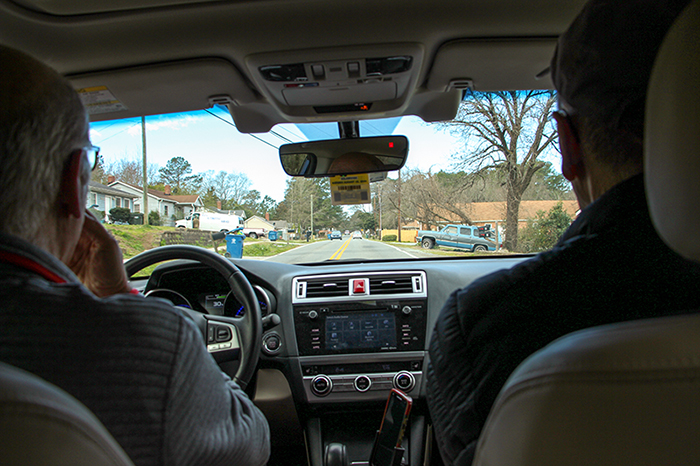
About 20 faculty and staff have volunteered with the Law School’s Meals on Wheels team over almost four decades. Richard Schmalbeck, the Simpson Thacher & Bartlett Professor of Law, coordinates the team, which currently includes A. Kenneth Pye Professor Emerita of Law Katharine Bartlett; Theresa Newman, the Charles S. Rhyne Clinical Professor of Law; Professor Emeritus Scott Silliman; Senior Lecturing Fellow Jane Bahnson; Associate Dean of Admissions and Student Affairs William Hoye; Melinda Vaughn, associate director and marketing manager of the Bolch Judicial Institute; and Sara Sun Beale, the Charles L. B. Lowndes Professor of Law and her husband, Duncan. (The team’s activities are temporarily furloughed due to adjustments necessitated by the Covid-19 pandemic.)
Sara Beale is the team’s “leader in friendliness,” Clotfelter says. “She’s already very sunny in her disposition and enthusiastic and then she brings that to her delivery.”
Beale says many of the clients she’s visited have made lasting impressions. “They demonstrated the transformative value of a positive outlook,” she says. “One older man, a paraplegic who lived alone, was always gracious and friendly. He certainly needed the meal, and I think he enjoyed having company for a few minutes. Another older man was unfailingly sunny and upbeat. After being hospitalized and having surgery, he used an ancient bike for support to walk slowly around to visit with his neighbors. When we arrived at his house, neighbors told us where to find him. He was like a ray of sunshine.”
Schmalbeck, who began volunteering in 1983, says the visits help save lives. “The visits provide a bit of a lifeline to the outside world for the clients. If they don't answer the door, this is reported back to [Meals on Wheels] HQ, and Social Services follows up.”
Returning from his final delivery, Clotfelter notes the client’s warmth. “We talked about each other’s shoes. She was just so friendly and appreciative.”
“It’s gratitude.”
On the drive to return their bags to the Meals on Wheels headquarters in east Durham, they continue to reminisce and reflect on the people they serve and the deprivation they often see on their routes. “Old age can be a hard thing,” Clotfelter says. “It gives you some kind of perspective that, in some unknowable way, it’s kind of made a little bit of a difference in just the way you look at things.”


